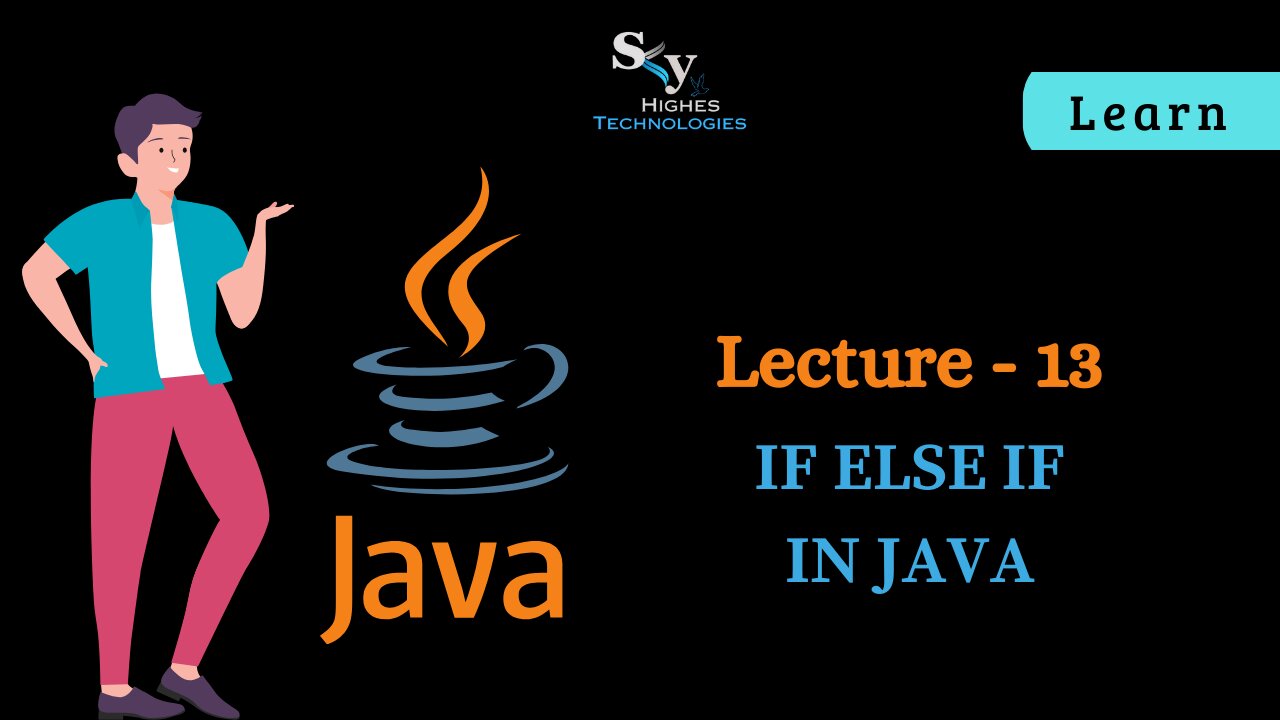Premium Only Content

#13 If Else If in JAVA | Skyhighes | Lecture 13
If-Else-If in Java: The Decision-Making Trio
Think of your Java code as a wise king in a kingdom, facing tough choices based on different situations. The if-else-if statements are the king's advisors, carefully analyzing conditions and suggesting the best course of action.
Let's break down their roles:
King - The if Statement:
Asks the first question: Evaluates a condition (true or false).
Decides the initial path: If the condition is true, the code block within the if statement is executed.
First Advisor - The else if Statement:
Offers alternative scenarios: Presents another condition to be checked if the if condition is false.
Guides the next step: If the else if condition is true, its corresponding code block runs instead of the if block.
Image of wise advisor whispering in the king's earOpens in a new window
satyamparamdheemahi.blogspot.com
wise advisor whispering in the king's ear
Second Advisor - Additional else if Statements (Optional):
More possibilities: You can chain multiple else if statements to consider even more conditions and offer specific responses for each.
Precise decision-making: Each else if acts as a separate advisor, providing a unique path based on its specific condition.
Final Option - The else Statement (Optional):
The catch-all solution: Provides a default code block to be executed if none of the if or else if conditions are met.
Ensures no gaps: Guarantees that the program always takes some action, even if none of the specific conditions apply.
Example:
Java
int score = 75;
if (score >= 90) {
System.out.println("Excellent! You got an A!");
} else if (score >= 80) {
System.out.println("Great job! You got a B!");
} else if (score >= 70) {
System.out.println("Good! You got a C!");
} else {
System.out.println("Keep practicing! You'll improve next time.");
}
Use code with caution. Learn more
Key Points:
Order matters! if comes first, followed by else if statements (in any order), and finally the optional else.
Each else if condition is independently evaluated, only executed if the previous conditions were false.
Use proper indentation for clear readability and to avoid confusion.
Remember: if-else-if statements empower your Java code to make informed decisions based on various scenarios. By mastering them, you'll transform your programs into intelligent beings, responding dynamically to the world around them. So, put on your kingly crown and start building impactful decision-making structures in your Java adventures!
Bonus Tip: Consider using switch-case statements for simpler scenarios with a limited number of distinct conditions.
-
 49:49
49:49
Candace Show Podcast
4 hours agoEXCLUSIVE: Blake & Ryan’s Desperate Legal Strategy Exposed! | Candace Ep 147
76.9K50 -
 LIVE
LIVE
2 MIKES LIVE
1 hour ago2 MIKES LIVE #180 with guest Kyle Rittenhouse!
202 watching -
 9:40
9:40
Tactical Advisor
6 hours agoBest Home Defense Shotgun Build | Genesis Gen 12
373 -
 56:44
56:44
VSiNLive
3 hours ago $1.63 earnedFollow the Money with Mitch Moss & Pauly Howard | Hour 1
21.7K -
 1:05:48
1:05:48
The Amber May Show
6 hours ago $0.19 earnedBig Balls | You Know It's Bad When Legacy Media Reports On Big Balls | Sam Anthony
3.43K -
 LIVE
LIVE
SoniCentric
1 day agoEnjoy a COZY Valentine's Day Escape to Paris with the BEST blend of Romantic Music
124 watching -
 1:59:52
1:59:52
Revenge of the Cis
4 hours agoEpisode 1447: Love Train
28.8K3 -
 1:03:34
1:03:34
In The Litter Box w/ Jewels & Catturd
1 day agoCONFIRM KASH NOW! | In the Litter Box w/ Jewels & Catturd – Ep. 742 – 2/14/2025
56.6K45 -
 13:38
13:38
Simply Bitcoin
11 hours ago $4.25 earnedFED’s Worst NIGHTMARE Just Got WORSE | $13M Bitcoin is Coming!
71.6K6 -
 10:25
10:25
Megyn Kelly
1 day agoNew Video and Details Emerge Showing "Serial Fraudster" Blake Lively's Past Actions, with Ruthless
65.5K13